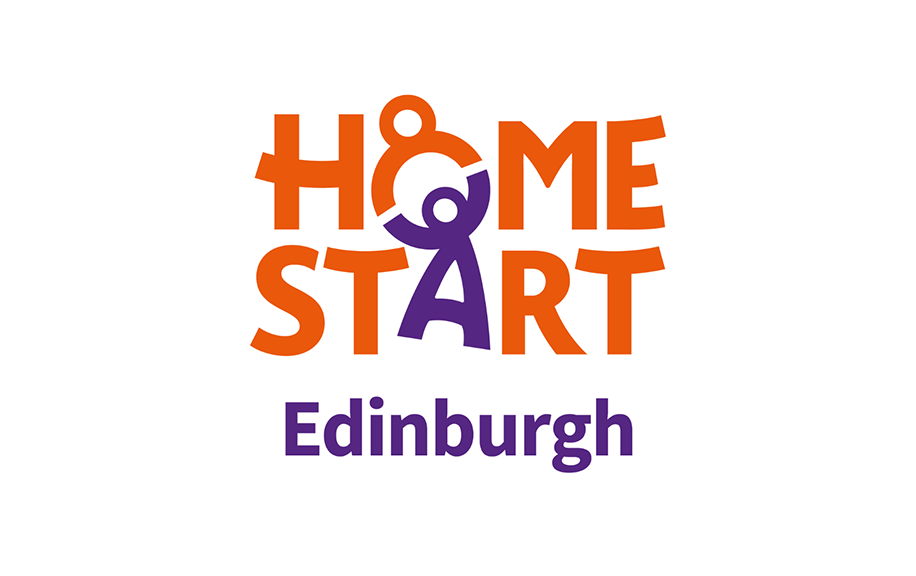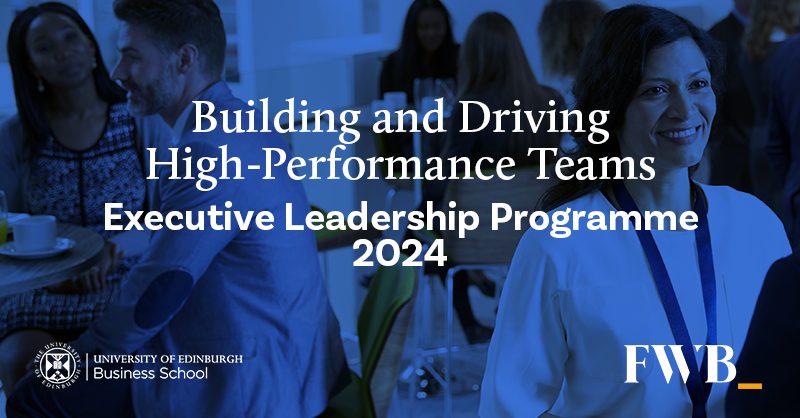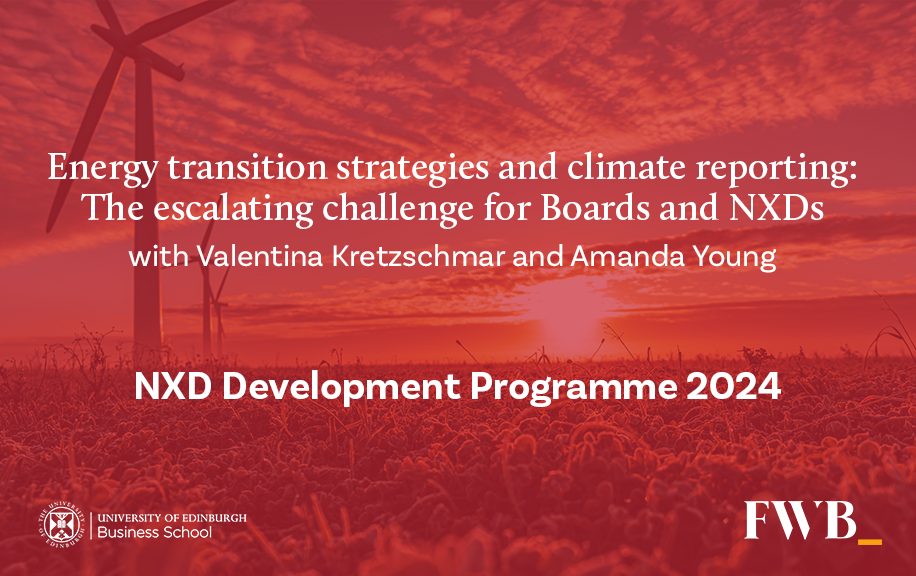Contact the team at FWB to discuss your individual or company requirements, or to discover more about our specialist services.
Driving Sustainability Effectively
13 November 2024
- Leadership Development

Session 4 of The FWB/University of Edinburgh Business School (UEBS) Executive Leadership Programme addressed ‘Driving Sustainability Effectively for Business and Environmental Benefit’ earlier this month. We were delighted to welcome two esteemed speakers on this subject – Dominic Fry ,Chair of Zero Waste Scotland and Royal Botanic Garden Edinburgh and Dr Sarah Ivory, Senior Lecturer in Executive Education, Climate Change and Sustainability at the University of Edinburgh and immediate past Director of the Centre for Business, Climate Change and Sustainability.
The session was centred on driving sustainability effectively for business and environmental benefit. It aimed to address the complexities of sustainability and its integration into organisational strategies, encouraging participants to ask critical questions about purpose, responsibility, and impact.
Sarah highlighted the diverse perspectives within boards regarding sustainability, ranging from those focused solely on profits to those passionate about environmental impact. She emphasised the need for all board members to understand and engage with sustainability issues. The discussion explored whether businesses exist primarily to make a profit, to produce goods and services, or to support a thriving society. This debate underscored the evolving nature of business purposes and the increasing importance of sustainability.
She also traced the historical evolution of business purposes from profit-centric models to more stakeholder-inclusive and society-focused approaches. She referenced key figures like Milton Friedman, Ed Freeman, and the Committee for Economic Development, highlighting their differing views on business responsibilities. Sarah also mentioned the Quaker capitalists like Cadbury and Hershey, who integrated social responsibility into their business models long before it became a mainstream concept.
In terms of Sustainability Frameworks, the concept of Triple Bottom Line, introduced by John Elkington, emphasises the importance of balancing social, environmental, and economic impacts. However, Sarah noted its limitations, such as siloed thinking and measurement challenges. ESG, while popular in the finance industry, also faces issues like perpetuating silos and focusing more on measurement than actual change. A more recent model, Donut Economics, developed by Kate Raworth, presents a more integrated approach to sustainability, considering both social foundations and ecological ceilings, and Sustainable Development Goals, 17 goals from the UN, provide a comprehensive framework for addressing global challenges, though achieving them by 2050 remains a significant challenge.
.
Unsurprisingly, the group focused on climate change, and Sarah stressed the urgent need to address it, highlighting its severe and escalating impacts. She explained the greenhouse effect and the role of emissions in driving climate change. She also introduced a matrix to help businesses assess their impact on and from climate change, identifying risks, opportunities, contributions to the crisis, and solutions.
Dominic outlined his corporate background in various sectors, including retail, energy, and public sector roles. He highlighted his work with organisations like Scottish Power and Marks & Spencer, focusing on sustainability initiatives. He explained that after retiring from his corporate career, he shifted his focus to sustainability, becoming chair of Zero Waste Scotland and the Royal Botanic Garden Edinburgh.
He discussed Scottish Power’s transition from coal to renewable energy and detailed the development and impact of Marks and Spencer’s Plan A, a comprehensive sustainability strategy that included initiatives like charging carrier bags and partnering with Oxfam for clothing recycling. Dominic emphasised the importance of engaging with various stakeholders, including employees, communities, and government bodies, to drive sustainability initiatives.
.
Key Takeaways from the session included:
- Strategic Alignment: Sustainability must be integrated into businesses’ core strategies, with full buy-in from top leadership.
- Complexity and Collaboration: Addressing sustainability requires acknowledging its complexity and fostering collaboration across different sectors and stakeholders.
- Ethical and Long-Term Focus: Businesses should adopt a purpose-led approach, balancing short-term profits with long-term sustainability goals.
- Continuous Learning and Adaptation: Boards and leaders must stay informed about sustainability developments and be willing to adapt their strategies accordingly.
.
These insights highlight the multifaceted nature of sustainability and the critical role of leadership in driving meaningful change within organisations. The speakers provoked engaging and informed debate and discussion, and the groups of delegates enjoyed the challenging and interesting case studies introduced by Sarah and Dominic.
The fifth session of The Executive Leadership Programme addresses ‘Building and Driving High Performance’ with Clive Miles, HR Director Barclays UK Every Day Money Management and Life Moments, BUK COO, Private Bank and Wealth Management COO , and Prof. Susan Murphy from UEBS.
Jointly run by FWB and the University of Edinburgh Business School (UEBS), the Executive Leadership Programme is designed to enable the next generation of leaders across multiple ownership classes or organisations within a broad range of private, public, and non-profit sectors.
For more information on ELP 2025 please contact Laura at elp@fwbltd.com.




